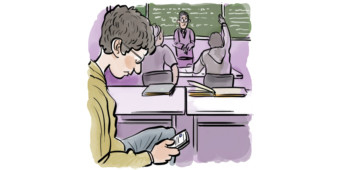
Dubai
Around 97 per cent of college students use their phones during class for non-educational purposes, as stated in a study published in the US-based Journal of Media Education. This not only threatens their academic performance, as they get distracted or lose their concentration, but is also a concern for professionals as it is turning into an addiction.
Amna Abudiak, a Kuwaiti student based in Sharjah, agrees that students can get easily distracted.
She said: “The screen is so small. You can easily exit whatever it is that you’re doing and open some other app. On a bigger screen, it can be monitored faster. When I use my phone, I say I am searching for something, but I am usually texting.”
However, she is not in favour of schools or universities banning phones on the premises. Why? For the simple reason that classes can get very boring.
She said: “Maybe the devices could be used for online discussions. Additionally, I had a tablet in high school and I thought it was very helpful for students to do their work.”
When it comes to younger classes, such as elementary school, Abudiak is against any form of technology. In her opinion, even if pupils are using technological devices, there should be a way to lock it so that they only use it for assignments.
According to a report published by the US-based nonprofit group Common Sense Media, teenagers and tweens in the US alone spend about nine hours a day using media for their enjoyment. With 73 per cent of 13- to 19-year-olds having access to smartphones in the country, it becomes very easy for them to do so, be it at home, in public or even in class.
In the UAE, the smartphone penetration stands at 73 per cent. Though the number of teens using such devices is not known, 72 per cent of the smartphone users are below the age of 34 years. So, it seems like more and more students are now using these devices.
Ali Raza, an Indian student based in Sharjah, uses his smartphone to check on social media in some classes and so, he admits that it “can be distracting”. But, he puts the blame on the professors for not enforcing the rules.
He said: “We don’t usually access the internet during classes. Our assignments have to be submitted online and we check on those after class. We’re not allowed to use our phones during class, but there is no enforcement. The issue is that some professors stop students, some don’t.”
Despite this, he believes that even if devices were completely banned from campus, some students would still find a way to use them.
Bayan Jijakli, a Syrian-American student based in Dubai, is of the opinion that she can multi-task in classes. Even if she does use her phone, she claims she is able to keep up with the lecture. However, some professors keep the students on their toes.
She said: “If the class is boring, I do check my phone if I have something to share or maybe to check on social media. There are some professors who are very slow and you can keep up with them. But, with others, you cannot even touch your phone. So, it all depends on the professor.”
She wants to be able to have access to her phone for online resources. The students can access lecture notes and even do a lot of research online.
She said: “If you get stuck with something, you can seek help from the internet. If there is something going on in class, like an activity, students will stay focused. Because at the end of the class, the work should be done.”
Now at a university level, Jijakli believes that pupils in school should not be using phones at all, because for them, it is definitely a source of distraction.
She said: “As an adult, I know when I get distracted. When we were younger, we weren’t mature enough to understand. I used to get easily distracted and had no control over the situation. At that age, children are less aware of their priorities.”
A lot of schools and universities now have online assignments and class notes. But, research shows that students are mainly using their phones to chat with friends or watch online videos.
Neama Hattab, a Palestanian-Jordanian student based in Dubai, has witnessed this firsthand, with some students in her class getting very distracted. In one of her classes, the professor took the phones away from a group of noisy students and it changed them altogether.
“They never spoke or participated in class when they had their phones. But, when the phones were taken away, they were suddenly participating! The professor joked that he’ll never return their phones.”
She is of the opinion that if students need to search for something, they can do so after class. In some classes, they are told to search information on the internet. But, when students take their phones out, they keep on using them.
She said: “Some professors don’t seem to care. If it’s a big class, it’s the students’ responsibility. Some get distracted with their phones, while others will concentrate no matter what.”
She confesses that she has also lost concentration at times when the teacher’s technique isn’t interesting. Some of them don’t encourage the students to participate and she finds this discouraging.
She said: “I want to study and learn, that is what I’m here for. But, if students are given the opportunity to keep up with events happening outside the class, they will do so.”
It seems like students are using their phones in classrooms for non-educational purposes. However, in their opinion, they are not getting distracted by the phone, but they lost their concentration before they even checked on their device.








